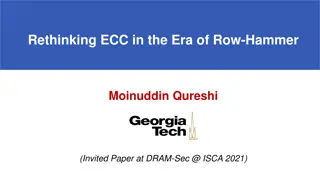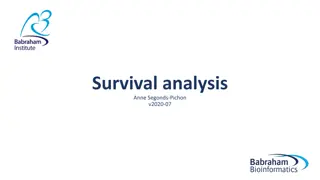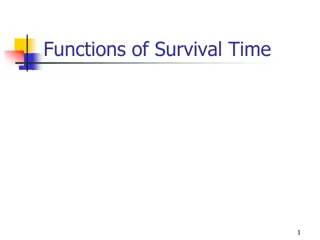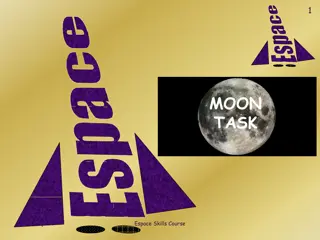Rethinking Survival in an Evolving World
Amid challenging existential questions and distorted conceptual frameworks, this article delves into redefining the notion of survival, denaturalizing its significance, and exploring functional bootstrapping in biological complexity. It encourages questioning conventional wisdom and proposing new strategies for navigating uncertain futures.
Download Presentation

Please find below an Image/Link to download the presentation.
The content on the website is provided AS IS for your information and personal use only. It may not be sold, licensed, or shared on other websites without obtaining consent from the author. Download presentation by click this link. If you encounter any issues during the download, it is possible that the publisher has removed the file from their server.
E N D
Presentation Transcript
Introduction Thinking has interests that do not coincide with those of living Ray Brassier, Nihil Unbound Species Survival We live in times that confront us with important questions regarding how we will survive as a species, questions which invite radical answers: How will we survive catastrophic environmental change? Abandon the earth? How will we survive technological self-modification? Radical techno-conservatism? How will we survive competition with artificial super-intelligence? Enslave it? Scales and Limits Species Cultures, Nations, Corporations, Families Persons Conceptual Problems The way in which these questions are posed tends to distort strategic thinking about how we answer them: By warping our understanding of what these systems are and how they work. By warping our conception of the means and ends of possible action.
The Abuse of Survival Conceptual Collapse The explanatory and normative significance of the concept of survival have been distorted by being collapsed into one another: Agonistic Metaphysics: treating competition over scarce resources as the fundamental principle governing the behaviour of all systems at all scales. Egoistic Hermeneutics: interpreting all motivations as in some way expressions of a fundamental drive to optimise one s chances of survival. In each case, survival is treated as the default priority, from which observed behaviour can accidentally diverge. Conceptual Strategy Question the naturalness of survival. Redefine the notion of self-interest. Articulate the relation between personal and supra-personal scales.
Denaturalising Survival Pseudo-Goals Indeterminate Content: it is not a specific goal but a general schema for such goals. Analogical Structure: it is a schema for constructing explanations and predictions about the behaviour of complex systems. Analogical Bootstrapping Functional Explanation: works by analogy with practical reasoning, getting predictive purchase on a system s behaviour by borrowing the distinction between success and failure. Represenational Explanation: works by analogy with theoretical reasoning, extending our predictive purchase on a system s behaviour by borrowing the distinction between accuracy and inaccuracy.
Functional Bootstrapping There are three layers of biological complexity. Machine Mode: composition (means and ends) Problems: autopoiesis, environment Strategy Mode: interaction (competition and co-operation) Problems: subordination, self-sacrifice Replicator Mode: reproduction (variation and selection) Problems: divergence, conflict, identity
Representational Bootstrapping There are three layers of psychological complexity. Control Modes: simulation (integration and availability); selection (self-model and options) Problems: death, satiation/satisfaction Generality Modes: representation (extension, integration, and revision); action (reasons, taking-true/making-true, unrestricted goals) Problems: extrapolated volition, integration/revision Autonomy Mode: self-legisation (theoretical/practical duality, selfhood as integration) Problems: libidinal outsourcing, suicidal projects
Analogical Failures Conceptual Failures How do misunderstandings of this analogy collapse the explanatory and normative dimensions of survival? How does a pseudo-goal become a universal default? Agonistic Metaphysics: literalises the survival analogy, which demands that local assumptions about the identity conditions of the agent and the structure of the problem space can be made globally determinate. Egoistic Hermeneutics: inverts the survival analogy, which means treating the goals of autonomous systems as if they were the drives of non-autonomous ones, and thus treating self-defining systems as if they were defined by explanatory assumptions. Personal Self-interest is self-realisation. Self-realisation demands self-definition. Supra-Personal Cultural Evolution: proliferation of ends rather than monopolisation of means. Cultural Survival: survival of the infrastructure of selfhood rather than survival of the species.























